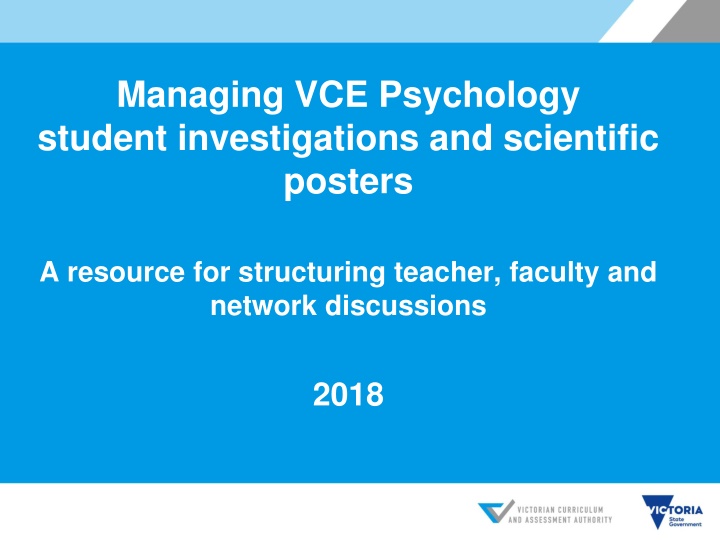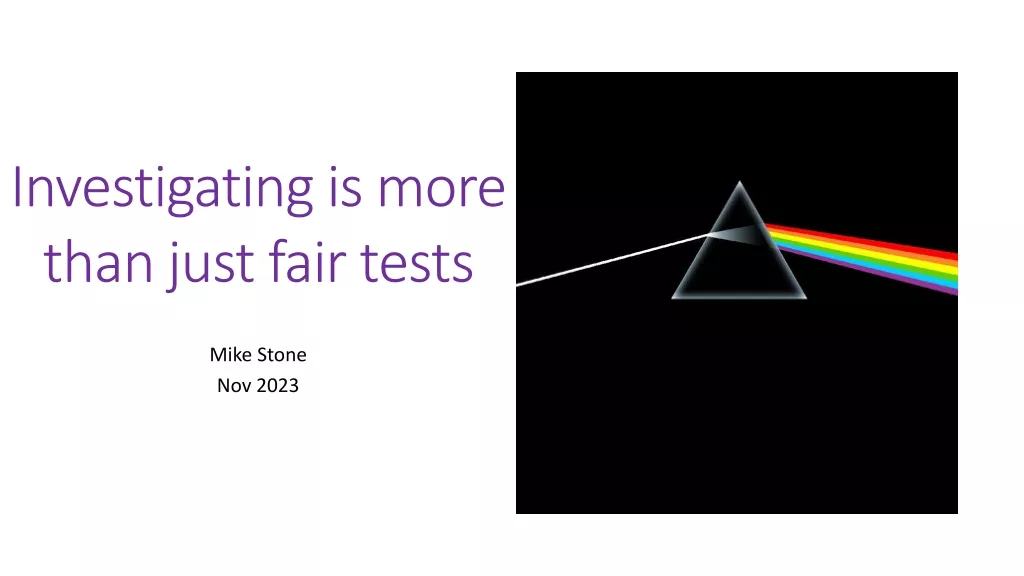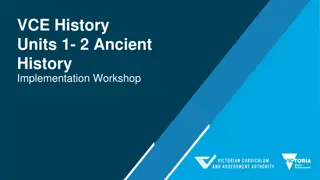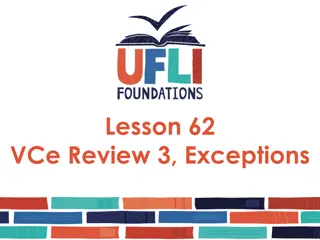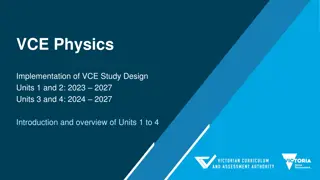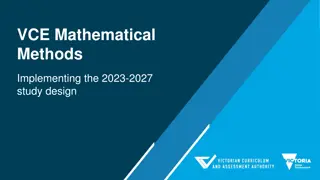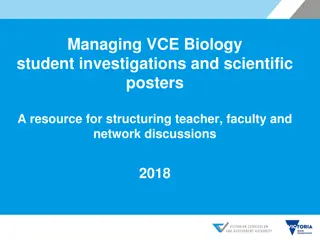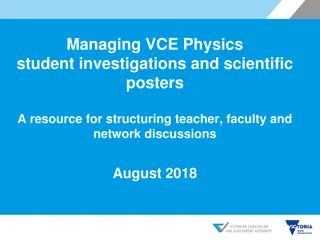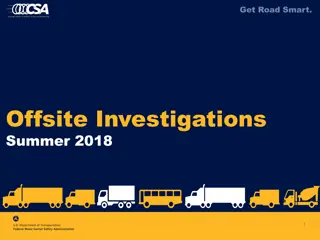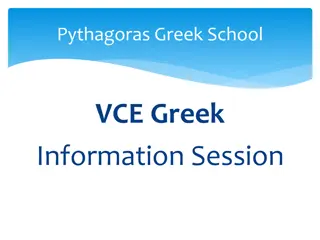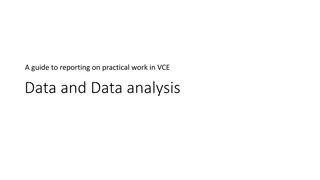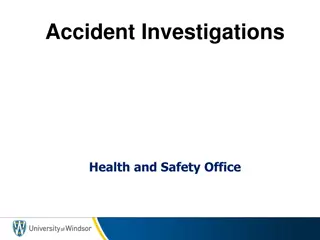Effective Strategies for Managing VCE Psychology Student Investigations and Scientific Posters
Discover valuable resources and practical approaches for structuring and managing VCE Psychology student investigations and scientific posters, including guidance on scientific poster requirements for Units 3 and 4, evaluating student work, and fostering effective science communication skills.
Download Presentation

Please find below an Image/Link to download the presentation.
The content on the website is provided AS IS for your information and personal use only. It may not be sold, licensed, or shared on other websites without obtaining consent from the author.If you encounter any issues during the download, it is possible that the publisher has removed the file from their server.
You are allowed to download the files provided on this website for personal or commercial use, subject to the condition that they are used lawfully. All files are the property of their respective owners.
The content on the website is provided AS IS for your information and personal use only. It may not be sold, licensed, or shared on other websites without obtaining consent from the author.
E N D
Presentation Transcript
Managing VCE Psychology student investigations and scientific posters A resource for structuring teacher, faculty and network discussions 2018
Resource Outline Section A: Scientific posters Section B: Student investigation topics in Units 3 and 4 Section C: Approaches to running investigations Section D: Managing student-designed practical investigations across Units 3 and 4 Section E: Laboratory usage Section F: Putting it all together
Section A Scientific posters
Scientific poster Units 3 and 4 VCAA template For Units 3 and 4, students scientific posters must include the following seven sections: - Title - Introduction - Methodology - Results - Discussion - Conclusion - Acknowledgments and references Word limit is 1000 words Notes: The VCAA template referred to in the listed assessment tasks for Unit 4 Outcome 3 refers to seven sections listed on the left side of this slide Physical templates, including digital poster template layouts, are readily available, free of charge, on the Internet
Scientific poster Units 1 and 2 Unlike the scientific poster requirements for Units 3 and 4, teachers of Units 1 and 2 may choose to: change word limits (for example, decrease) provide greater scaffolding of the poster allow students to produce the poster as a group assignment/assessment task assess the poster as a group assignment/ assessment task. Discuss: How can poster sections be scaffolded such that there is a balance between providing support for students whilst enabling students to be differentiated, particularly at the top end ?
Evaluating scientific posters Prior to beginning work on constructing a scientific poster, it is useful to unpack the strengths and weaknesses of de-identified student work from previous years and/or scientific posters accessed on the Internet Display a selection of 10-20 posters around the classroom Students work in pairs or threes and use three different coloured post it notes representing strengths , limitations and suggestions for improvement to evaluate a poster Student groups then move around the room to evaluate remaining posters, overlapping similar comments provided by earlier groups Teacher leads a discussion to compare ideas and to summarise elements of effective science communication. Discuss: Is this activity worthwhile undertaking for Units 1 and 2 as well as for Units 3 and 4?
Scientific posters: Succinct communication of science Issues with student posters typically include: poster title not worded as a question including data tables (unnecessary) as well graphs inappropriate graph scaling, axes and labelling small font size not easily read too wordy lack of graphics/illustrations/flowcharts to balance words inclusion of unnecessary information. Further advice about the construction of scientific posters can be found in the Advice for teachers on the VCAA website
Discussion: Science communication The most common problem for students when constructing their scientific posters is exceeding the word limit and having a high word/graphic ratio. Discuss: What strategies can be used to assist students to communicate science ideas more succinctly? Which graphic types require explicit teaching as representations of science understanding and skills?
Poster logistics No drafts In Units 1 and 2, a scientific poster may be based on research (library/secondary sources) or primary research In Unit 3 or 4, or across Units 3 and 4, the poster: - must involve collection of primary data - must include seven sections of poster template, with acknowledgment of level of guidance - may be an extension of a common experiment or fieldwork exercise - may be generated by students based on their own research and subject to authentication (use of photos/video noted in logbook) - may be undertaken as a class with students contributing to design - may be assessed in stages (if modification required, original marks hold) - marks will be moderated against the examination class rank order important.
Poster authentication strategies Adopt and/or adapt current authentication strategies for tasks requiring extended experiments and/or practical activity reports Mark poster sections progressively Use specific questions about science investigation processes as part of the poster development under test conditions Logbook with dated entries should correlate to student work on poster Observed practical procedures in class Question students about content in specific parts of their poster. Discuss: Are other authentication strategies appropriate for your school? Do you have a school/faculty policy for authentication of student work?
Section B Student investigation topics in Units 3 and 4
Unit 4 Area of Study 3: Student-designed investigation Coupled or open inquiry Commonly, this investigation would involve coupled or open inquiry Student skills in inquiry types should be scaffolded Refer to the Advice for teachers for more information about coupled and open inquiry Scientific inquiry methods A range of inquiry methods area appropriate for the student-designed investigation Refer to the Advice for teachers for more information about scientific inquiry methods Investigation approval Not all student-designed investigations can be allowed to proceed Investigations must be managed in terms of resources, safety and authenticity.
Discussion: Developing research questions and hypotheses A suitable research hypothesis should contain an IV, DV and a predicted effect of the IV on the DV. Variables do not need to be operationalised as part of the hypothesis however as part of their methodology, students should be able to operationalise variables. Discuss: What advice would you give to students who presented the following hypotheses: Playing video games improves memory/ affects concentration Younger people learn faster than older people Memory may be affected by the amount of sleep.
Evaluation of research findings P-values are no longer required for VCE Psychology Mathematical requirements in revised study design: - presenting data from tables as bar charts or line graphs - calculation of percentages - calculations of mean as a measure of central tendency - understanding of standard deviation as a measure of variation around the mean. Discuss: Identify opportunities for the generation, evaluation and discussion of data in VCE Psychology
Some interesting 2017 student investigation topics Is memory ability influenced by listening to music? How does type of music affect memory ability? How does race affect the ability to remember same race and different race faces? Do parents level of exercise influence their children's level of exercise? Is there a relationship between colour and mood? Do shift workers have impaired memory function? Does chewing gum improve concentration/ decrease stress? What does the community consider to be protective or risk factors in mental health? Do particular scents increase capacity to remember a list of words?
Discussion: Refining proposed student investigations Students are required to design their own investigations. Not all investigations proposed by students can be permitted to proceed: it is the responsibility of the class teacher to ensure that all proposed student investigations are safe, ethical, legal and specific enough so that they can be undertaken within set timeframes. The next slide shows examples of proposed student investigation topics that should not be approved. Discuss: How can these topics be modified so that the investigations may be undertaken safely, ethically, legally and in a timely manner by students? What topic approval processes are in place at your school?
Examples of student questions that require refinement/changing How does the organisation of words affect their immediate recall? (Issue: Question is too broad re organisation ) What is the relationship between cannabis use and mental health? (Issues: Secondary data alone is not compliant with investigation scope; generation of primary data in relation to this topic is not appropriate at secondary school level) Does being in an altered state of consciousness affect time orientation? (Issues: How will this be tested? Which state/s of consciousness?) Does diet impact mental health? (Issues: Topic too broad; not feasible within time constraints) Can false memories be implanted in a person? (Issue: Ethical concerns are associated with this topic).
Discussion: Investigation ethics and safety Students cannot proceed with an investigation unless it is safe and ethical to do so. Discuss the role of each of the following in ensuring that investigations proposed by students are safe, ethical and manageable: student science coordinator classroom teacher laboratory technician.
Section C Sample approaches to running investigations
Developing investigation skills Investigations may involve students: generating primary data (practical investigation) collecting secondary data working in groups working independently Discuss: VCE Psychology offers flexibility for schools to scaffold the development of students inquiry and investigation skills. Use a table, such as the one below, to map your school s scaffolding of these skills: Unit Generate primary data Collect Work in groups Work secondary data independently 1 2 3 4
Unit 1 Area of Study 3 Sample approach 1: Teacher-provided list of topics Teacher provides a list of possible research questions from pages 16 17 of the VCE Psychology Study Design Students submit a proposed timeline and research plan related to a research question of interest A negotiated research question is undertaken by the student and monitored by the teacher.
Unit 1 Area of Study 3 Sample approach 2: Group investigation Groups of students investigate a selected and/or negotiated research question from the set of possible questions on pages 16 17 of the VCE Psychology Study Design Each member of the group contributes a nominated newspaper item related to the research question in a class psychology e-newspaper (for example, letter to the editor, a report of a psychological issue, survey results from a public opinion poll related to a psychological issue, a cartoon about a psychological issue, interview with a psychologist, neuroscientist or other psychological professional).
Unit 1 Area of Study 3 Sample approach 3: Experimental investigation The teacher selects questions from each of the six topic areas listed on pages 16 17 of the VCE Psychology Study Designthat have an experimental theme Students work individually or in groups to provide a response to investigate the research question of interest Sample questions in this category include: Are brain training programs effective? Does the use of technology prior to sleeping change sleeping patterns? Are emotions contagious?
Unit 1 Area of Study 3 Sample approach 4: Case study The teacher selects questions from each of the six topic areas listed on pages 16 17 of the VCE Psychology Study Designthat have a case study theme Students work individually or in groups to provide a response to the case study Sample questions in this category include: How can brain trauma in injuries affect cognitive function? How has the treatment of mental illness changed over time? How are different neuroimaging techniques used to study brain structure and function? How does foetal alcohol syndrome affect nervous system functioning?
Unit 1 Area of Study 3 Sample approach 5: Student topic selection The teacher provides students with the list of questions from each of the six topic areas listed on pages 16 17 of the VCE Psychology Study Design at the start of Unit 1 as examples of possible research (primary or secondary) investigation Students are given an extended time to consider their own question for investigation, including allowing time for students to research other relevant topics on the Internet Students submit proposed topics to teacher Negotiated investigation topic between teacher and student.
Discussion: Structuring Unit 1 research investigations A number of approaches can be used to structure student investigations in Unit 1 Area of Study 3, including the five approaches listed in the previous slides. Discuss: Identify the strengths and limitations of the five approaches listed in the previous slides Evaluate the approach currently used at your school for structuring the investigation in Unit 1, Area of Study 3 Identify the advantages and disadvantages of designing investigations that utilise primary versus secondary data.
Sample approaches to structuring Unit 2 student investigations Investigation topic may relate to either neuroscience (taste/smell) or social psychology Teacher determines extent of student choice, depending on resources and class sizes Students may undertake and report on their investigations as individuals or in groups. Discuss: Solving contemporary science problems generally involves teamwork. How can teamwork in undertaking a group investigation be organised and assessed?
Units 3 and/or 4 Sample approach 1: General question How important are cues in memory? A single broad investigation question: enables all students to design and undertake a unique experiment promotes inquiry-based learning. The purpose of this investigation question is for diverse interpretations of context- and state-dependent cues.
Units 3 and/or 4 Examples of student questions derived from Approach 1 related to context-dependent cues Are some context-dependent cues better than others? Can long-term memory be improved through the use of context- dependent cues? Does age play a role in the effectiveness of context-dependent cues? Do context-dependent cues work better on younger students compared to older students? Is there a gender difference in the effectiveness of context- dependent cues? Do context-dependent cues help students learn in the classroom? Do context-dependent cues work outside of the classroom?
Units 3 and/or 4 Sample approach 2: limited topic choice There will be choice of four questions for all students: 1. Does using different types of font for a set of words affect recall? 2. Does meaningfulness affect recall? 3. Do leading questions influence recall? 4. Does playing different types of background music affect recall?
Units 3 and/or 4 Sample approach 3: Flipped classroom Students: have open choice of topic undertake own research out of class submit research investigation proposal. Teachers: approve/provide feedback re appropriate modifications to methodology monitor undertaking of investigation assess student capacity to design further investigations following completion of investigation.
Units 3 and/or 4 Sample approach 4: building on prior research Teachers or students identify a general research snippet, found in scientific publications and/or the media, as a stimulus for an investigation Students propose a research question, hypothesis and methodology that is prompted by the research snippet Teachers approve/modify the student proposed investigation so that the investigation is safe, ethical and manageable.
Example of a research snippet to illustrate Sample approach 4 Often find yourself chewing gum like an upset coach on the sidelines? Don t worry. A study from Cardiff University in Wales found that chewing gum can boost thinking and alertness particularly if chewed during a cognitive activity. - Herald Sun, Body & Soul, 23 July 2017
Example of a research snippet that should not be undertaken With beetroot juice before exercise, aging brains look 'younger' Date: April 19, 2017 Source: Wake Forest University Summary: Drinking a beetroot juice supplement before working out makes the brain of older adults perform more efficiently, mirroring the operations of a younger brain, according to a new study. Discuss: What issues are associated with using the research snippet above as the basis of a student practical investigation? How could the article be used as the basis of a Unit 1 investigation and/or an assessment task in Units 1 to 4?
Discussion: Structuring Unit 3 and 4 student investigations A number of approaches can be used to structure student investigations across Units 3 and 4, including the four approaches listed in the previous slides. Discuss: Identify the strengths and limitations of the four approaches listed in the previous slides Evaluate the approach currently used at your school for structuring the investigation across Units 3 and 4.
Section D Managing the student- designed practical investigations across Units 3 and 4
Typical timeline (suggested 7 to 10 hours) Approximately 2 hours: Students research question, research possible methods, confirm investigation with teacher and provide methodology and equipment list needed for the task. 2-4 hours: Students reflect on feedback from teacher about their proposed investigation, consider whether their proposed method is feasible and can be replicated, and refine scientific procedure as required. Commence data generation. Students maintain logbook records. Teacher checks and signs off logbook entries. 3-4 hours: Continuation of data generation, data processing and data analysis. Students were given electronic poster template in the last double period of week 3 and completed their own scientific poster. Discuss: Does the student investigation necessarily need to be completed in a single block of time?
Discussion: Unpacking key science skills The time allocated to the student-designed practical investigation requires that teachers: explicitly teach required knowledge and skills unpack students misconceptions/ uncertainties/ errors etc. Discuss: 1. How is the student design process managed in your class/ at your school? 2. How are students range of skill competencies catered for?
Testing students capacity to design investigations Unit 4 Outcome 3 in the study design requires that students design and undertake a practical investigation Discuss: Given that this outcome may be completed at any point across Units 3 and/or 4, discuss the strengths and limitations of assessing (diagnostic, formative and/or summative) students capacity to design investigations: (a) before they undertake their own investigation (b) after they undertake their own investigation (c) both before and after they undertake their own investigation.
Content basis of the VCE Psychology student practical investigation in 2017 (N = 103) 70 60 50 % schools 40 30 20 10 0 Unit 3 only for all students Unit 4 only for all students A choice of Unit 3 or Unit 4 for all students A mixture of Unit 3 and Unit 4 for all students Selected unit/s
When was the VCE Psychology student practical investigation undertaken in 2017? (N = 103) During Unit 3 During Unit 4 After the completion of Unit 3 and before commencing Unit 4 Staged across Unit 3 and Unit 4 0 5 10 15 20 25 30 35 40 45 % schools
Tips for effective feedback (from 7 Key Characteristics Of Better Learning Feedback by Grant Wiggins, updated 2017 Helpful feedback is: Goal-referenced Transparent Actionable User-friendly Timely Ongoing Consistent.
Discussion: Feedback Providing students with meaningful feedback can greatly enhance learning and improve student achievement. - various educational research findings Discuss: How and when do you provide feedback to students about their progress in: (a) VCE Psychology? (b) the design, undertaking and reporting of their Unit 4 Outcome 3 investigation?
Section E Laboratory usage
Laboratory facilities for VCE Psychology in 2017 (N = 42) Laboratories available at school for psychology practical activities School has a designated psychology laboratory School has a wet/dry laboratory for psychology classes Virtual laboratories are used for activities not possible/available at school External laboratories are accessed for undertaking psychology practical activities Laboratories are well fitted out for psychology practical activities 0 20 40 60 80 100 % schools
Virtual laboratories The 2017 VCE Psychology SAC audit showed that over 30% of schools used virtual laboratories as part of their teaching and learning program, whilst no schools utilised local universities/science institutions to support their school programs Discuss: (a) What opportunities exist for extending VCE Psychology outside the classroom? (b) Which other schools and VCE Psychology organisational and teacher networks could be accessed for resource sharing?
What % time was spent teaching VCE Psychology in a laboratory in 2017? (N = 42) exactly 100% between 75% and 100% % teaching time in a lab exactly 75% between 50% and 75% exactly 50% between 25% and 50% exactly 25% between 0% and 25% exactly 0% 0 10 20 30 40 50 60 % schools Discuss: To what extent is a laboratory required for VCE Psychology investigations?
How much notice was given to lab techs to prepare practical activities for psychology in 2017? (N = 42) 1 day 2 days 3 days Between 3 days and 1 week Between 1 and 2 weeks 2 weeks Longer than 2 weeks 0 5 10 15 20 25 30 35 40 % schools
Science faculty experimental investigation planner Lab managers and science leaders should work together to plan investigations across all VCE sciences for a calendar year so that neither human nor physical resources are exhausted Units 1 and 2 can be taught in any order; Units 3 and 4 must be taught as a sequence.
Sample experimental investigation planner Jan Feb Mar Apr May Jun Jul Aug Sep Oct Nov Dec VCE Science Unit Biology 1 2 3&4 Chemistry 1 2 3&4 Enviro Science 1 2 3&4 thermo Physics 1 2 3&4 Psychology 1 2 3&4 No labs Experimental investigation Research investigation Physics options Colour coding
